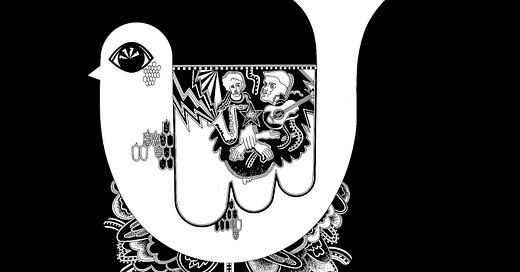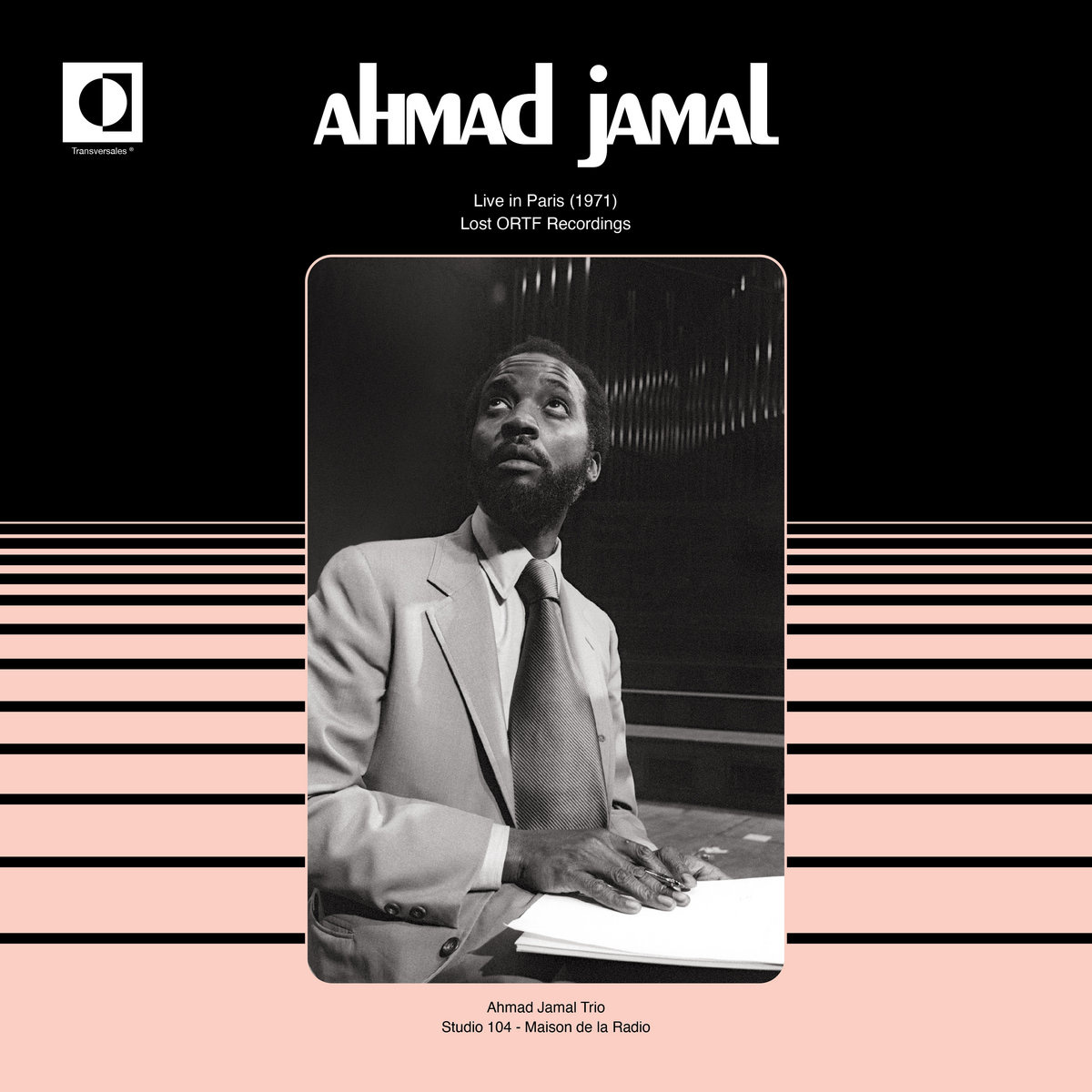I was fortunate enough to see Ahmad Jamal perform a few years ago, at the McCarter Theater on the campus of Princeton University. Jamal will turn 93 next summer, and he doesn’t perform live very often anymore. So when the opportunity to see him arose, I jumped. I’d recently interviewed his longtime drummer, Herlin Riley, and was expecting an evening of dignified swing that combined bluesy vamps with some classical flourishes and lush, romantic melodies. That was not at all what transpired.
Jamal began his professional career playing a kind of chamber jazz, before that was really a thing: his early albums featured a piano/guitar/bass trio. When he formed a more traditional group, though, with bassist Israel Crosby and drummer Vernel Fournier, he broke out. His 1958 album At The Pershing: But Not For Me, which contained his best-known song, “Poinciana,” stayed on Billboard’s album charts for over two years, and ultimately sold over a million copies.
At the Princeton show, Jamal was joined by bassist James Cammack, who’s been playing with him for something like 40 years; Riley on drums; and Manolo Badrena on percussion, which encompassed everything from congas to trap drums to wind chimes to a small electronic device that played a sample of Mr. T shouting, “Quit the jibber-jabber!”, surprising audience and band alike. This was a high-powered rhythm section: Riley anchored the Jazz at Lincoln Center Orchestra for 17 years, and has made two albums as a leader in recent years — 2016’s New Direction and 2019’s Perpetual Optimism, both of which are excellent. Badrena was a member of Weather Report and Spyro Gyra, among many other groups. And they came to play.
Jamal announced the title of every tune either before or after he played it, and conducted from the bench, starting pieces solo and pointing to Riley or Badrena when he wanted them to come in, then offering additional gestures to indicate tempo changes or returns to the main melody. (This Wax Poetics interview offers great insight into Jamal’s career and musical concepts.) The set began with “Quest For Light,” from his 1987 album Crystal, an uptempo vamp with ornate melodic fills that set the tone for the night. Badrena was doing every bit as much work as Riley — the two of them, and Cammack, swung ferociously hard and fast. Jamal clanged out rumbling chords from the low end of the keyboard, created suspense by hanging onto a two-note figure until it felt like an explosion was coming, and danced across the higher keys.
As the set went on, it only seemed to increase in intensity. The band swung harder and harder, the drummer and percussionist practically dueling with each other, speeding things up to a frantic, breakneck pace without ever losing control of the hypnotic groove, as Jamal and Cammack encouraged them and kept the music flowing. After the fourth number, I was astonished to see Riley — impeccably dressed in what was clearly a three-piece suit with the jacket left backstage — slip his shoes off.
Between tunes, Jamal mentioned that he likes to hire drummers from New Orleans. In addition to Riley and Fournier, he also worked with Idris Muhammad for years. The grooves these men set up for him allowed him to take pieces as far out as seemed possible, and then keep on going. Even the expected closing version of “Poinciana” was far from a rote recitation of a familiar tune; these guys were on a quest to somewhere, and we were just following along. This was as far from a mellow evening out as I could have imagined. I’m incredibly glad to have seen Ahmad Jamal live.
Jamal’s music has passed through several major phases without ever truly changing in any essential way. He’s got a style and an approach, and he’s capable of wringing a seemingly infinite number of variations out of it. But at the dawn of the ’70s, he was in a particularly interesting place, creatively speaking.
In the mid ’60s, he revamped his trio; bassist Jamil Nasser joined in 1964, and drummer Frank Gant (from Detroit, not New Orleans) arrived two years later. They made two albums, 1967’s Cry Young and 1968’s The Bright, the Blue and the Beautiful, which are somewhat Lawrence Welk-ish — the trio is joined by a choir — but occasionally compelling nonetheless. Those were followed by the more conventional Tranquility and At the Top: Poinciana Revisited, which contained a mixture of standards and pop tunes. Then a change came.
Jamal’s 1970 album The Awakening was still an acoustic trio album, but it had more rhythmic whomp, and it felt more inspired somehow. It gained an audience outside the jazz world, too; decades later, samples from the title track and his version of “I Love Music” would turn up in tracks by Nas and Jeru the Damaja, among others.
In June 1971, Jamal, Nasser and Gant played at the Montreux Jazz Festival in France, as part of their first-ever European tour. The concert was recorded, and split into two LPs: Freeflight, which included four pieces, three of which were in the 10-11 minute range; and Outertimeinnerspace, which contained just two side-long tracks, the 16-minute “Bogota” and the nearly 19-minute “Extensions.” These performances were notable for more than just their (for Jamal) radical length, though; he had also added the Fender Rhodes to his toolkit. Played back to back, the two albums offer a remarkable 75 minutes of music. Take, for example, “Manhattan Reflections,” where Jamal and his rhythm section spend the first two minutes lingering on a single melodic riff, playing it over and over until it gains an almost trancelike quality; then, doubtless after one of the nods I described above, Gant unleashes a short but potent drum fill and Jamal switches from acoustic piano to Fender Rhodes and the piece heads into a completely different, almost psychedelically expansive zone. This use of trancelike repetition is one of Jamal’s most powerful tricks, and he deploys it — as does Nasser — many times on these LPs. (Also, there’s a moment about four minutes into “Bogota” where Jamal plays a mini-melody on the Fender Rhodes that sounds uncannily like the tune my grandparents’ grandfather clock used to bong out every hour.)
Now, another live recording from June 1971 has been released. The Transversales Disques label, which has also released previously unknown live music by Archie Shepp and Pharoah Sanders, has unearthed a studio performance from eight days after Montreux, taped by ORTF (the French national radio and TV broadcaster). It’s not the complete performance, only 40 minutes, but once again the trio stretches out on a 15-minute “Bogota,” a 10-minute “Manhattan Reflections,” and a 14-minute “Effendi.” And it’s every bit as exciting as the two Impulse! albums; in fact, it could even be better than those.
For one thing, the quality of the recording itself is amazing. Freeflight and Outertimeinnerspace were recorded onstage at an outdoor concert, so you get the excitement of an enthusiastic audience, but you also get some inevitable sonic roughness. There’s an audience present here, too, but this set was recorded in a radio station’s studio, and the sound is pristine. Jamal’s grand piano rings like a rack of tuned bells, and the Fender Rhodes is ultra-clean. Nasser’s bass has a pleasingly woody boom, lacking the overdriven rubber-band sound that engineers frequently saddled upright bassists with in the ’70s. Gant’s drums are mixed lower than they probably sounded on the night, but his attack is sharp and precise, every strike clearly audible, and when he brings the energy level up a notch about halfway through “Bogota,” with some cracking snare hits, or when he takes his own solo around the 13-minute mark, you notice.
The other thing you notice, listening to this beautifully recorded performance, is just how much energy each member of the trio is contributing to the whole, and how key the repetitiveness of the music is to that. On the version of “Manhattan Reflections” found here, Gant lets Jamal and Nasser start the piece without him, and the way they build the intensity, seemingly playing faster and faster as they work variations on the opening melody, can almost be compared to the way a techno track ramps up, and then at the two-minute mark, the drummer comes in with something very much like a beat drop, and we’re off and running for real. By the five-minute mark, Jamal is hitting the keys hard, but with a precision that few pianists short of Cecil Taylor could match, and the rhythm section is right there with him. And around eight minutes in, Nasser and Gant lay down what I can only describe as high-intensity breakbeat science.
The version of “Effendi” here almost seems to start in medias res; there’s no gradual build-up, they’re going full steam from the first note, and once again Gant is slamming the kit like a door to punctuate Jamal’s runs, as Nasser bounces along beside them like a dog accompanying a marathoner. Listening to this album, I can hardly believe there was a time when my attitude toward piano trio records was, basically, “When do the horns come in?” This is high-intensity music, all the more so for its melodicism and deceptive simplicity. Ahmad Jamal is simply not discussed often enough in the hushed, worshipful tones he should be, and if you’re looking for an entry point into his music, this album, along with everything else he did in 1970 and 1971, is it.
Before you go, a couple of links:
• Burning Ambulance Music is the record label side of this operation, and we have six CDs out: Senyawa, Ivo Perelman/Nate Wooley, Matthew Shipp/Whit Dickey, Graham Haynes/Submerged, José Lencastre, and Breath of Air (Brandon Ross, Charlie Burnham and Warren Benbow). They’re all excellent, and they come in beautiful mini-LP style packages. Buy them, please. (There’s even a bundle; you can get all six for $60 plus shipping!)
• Like every week, I wrote a bunch of reviews for the Shfl; this time, I tackled albums by Montrose, the Rollins Band, David Lee Roth, Soundgarden, and (boo! hiss!) Ted Nugent. Here’s the link.
• Todd Manning reviewed the new Oxbow live album, with special guest Peter Brötzmann, for the main site. Here’s that link. (It’s a really, really good album; I reviewed it myself, for The Wire.)
• I’m pounding away at my next book, In the Brewing Luminous: The Life and Music of Cecil Taylor, and it’s going pretty well, I think! I’ll be publishing an excerpt from Chapter Two soon, which you’ll be able to read…if you’re one of my Patreon supporters.
That’s it for now. See you next week!





